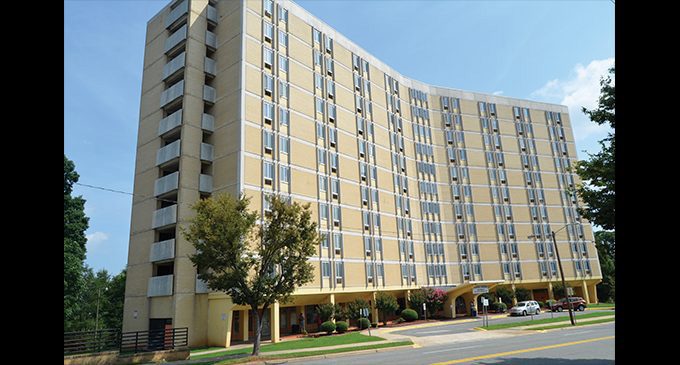Crystal Towers’ residents will be forced to move
Crystal Towers located on Sixth Street downtown Winston-Salem.

Less than a year after they announced the sale of the building, next month the Housing Authority of Winston-Salem (HAWS) is expected finalize the sale of Crystal Towers.
Here’s what we know: Built in 1968, Crystal Towers is one of three high-rise towers in the city for senior citizens and those with disabilities. In August of last year, HAWS’ Board of Commissioners voted to sell the 11-story high-rise building, citing more than $7 million in repairs as the reason for the sale. At that time HAWS’ Executive Director Larry Woods told The Chronicle Crystal Towers needed renovations to the elevators, drainage lines, electric switch gear room, and resurfacing of the roof. He also said units in the building needed new kitchen cabinets and appliances, flooring and new air conditioning systems.
In an article published in The Chronicle on Thursday, Aug. 23, Woods said in recent years HAWS has received less funding from the Department of Housing and Urban Development (HUD), which made it impossible for the organization to afford the renovations or get a loan.
Less than two months after the sale of the property was made public, several members of the Winston-Salem City Council reached out to HAWS to ask that they not sell the building because it would displace citizens, but according to HAWS, the city never made an offer for the building. According to HAWS general counsel and Vice President of Real Estate Development Kevin Cheshire, at least six offers were made on the building between Aug. 20 and Oct. 15.
He said after evaluating all the offers, they identified which one was the best. Cheshire said the Board of Commissioners has not signed the contract yet because they’re still waiting on the okay from HUD.
“Our board has not signed the contract because we’re waiting on some guidance from HUD to make sure we can sign without additional approval from them. We’ve been told by the HUD officials that they think it’s probably okay, but they need to be certain so we’re waiting to hear back from them,” said Cheshire. “We’re hoping to have approval in April, but right now it’s just wait and see if HUD gives us the green light to go ahead and sign the contract.”
When discussing the displacement of the 200 residents who currently call Crystal Towers home, Cheshire said before the contract is signed, they plan to hold a meeting to let residents know whom the building is being sold to and the next steps. As for relocation cost, Cheshire said residents will have the option to receive a voucher or relocate to another property owned by HAWS.
Voucher amounts will be based on income. Residents are required to pay 30 percent of their gross adjusted income and HAWS will provide a subsidy for the rest of the total cost.
“All residents will be getting a continued subsidy. It’s just some residents may decide that they are better suited for our public housing communities and they’ll relocate there; other residents may decide that they prefer the voucher,” Cheshire said.
Cheshire said what is happening with Crystal Towers is happening across the country. He said HUD’s change to its subsidy formula has had a major impact on how they take care of renovations. Historically, capital subsidies were used to make improvements and renovations to properties, but with the cut in funding Cheshire said the subsidy isn’t enough.
“The capital subsidy is insufficient to meet the need and HUD knows that as well. This is not unique to Winston-Salem,” he continued. “I don’t know the exact number, but HUD has published what they identify as the capitol need versus the capital budget and its a billion dollar deficit between what HUD is able to provide for capital subsidy versus the actual capital needs that are existing in the housing facilities across the country.
“… This is not something we’re doing because we want to. We exist for the purpose of providing safe and affordable housing to people who otherwise wouldn’t be able to afford it. We’re not in the business of repositioning our assets and displacing our residents,” said Cheshire. “We would just rather do it right now when there’s an option and there’s a dignified way of going about it, instead of waiting five years when the building’s falling and the elevators aren’t working and it’s an emergency situation.”
Although the sale is not yet final, funds from the sale of Crystal Towers are expected to be used to build smaller housing developments with about 40 to 50 units. According to Cheshire, they want the units to be spread out across the community with easy access to food, medical care and other resources.









